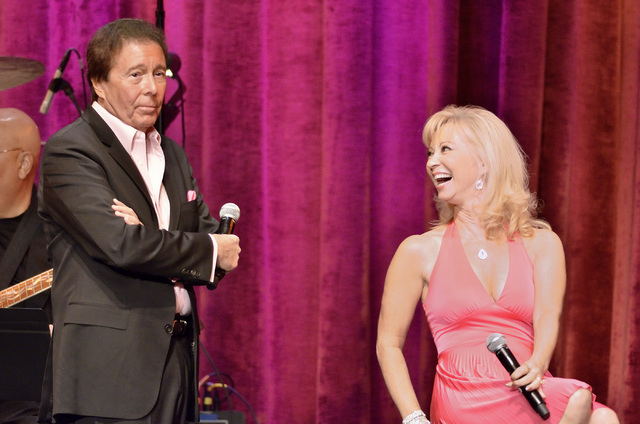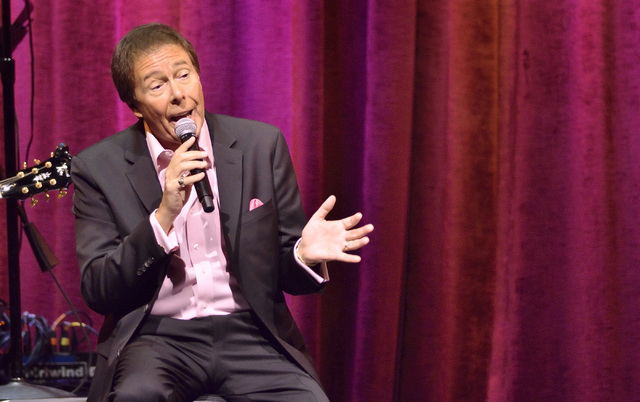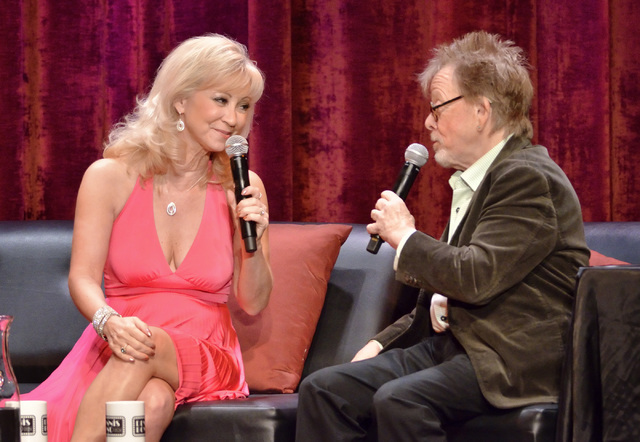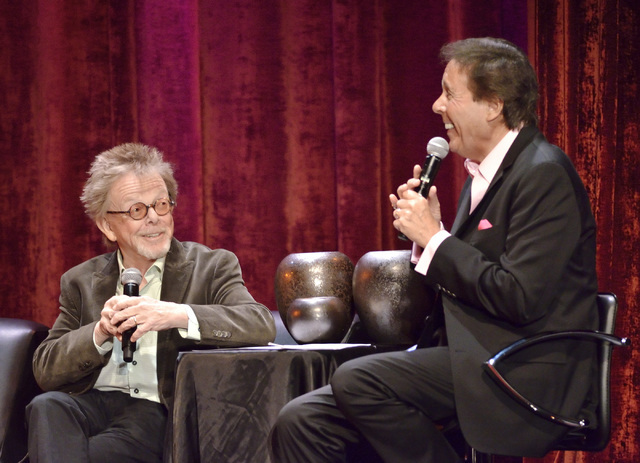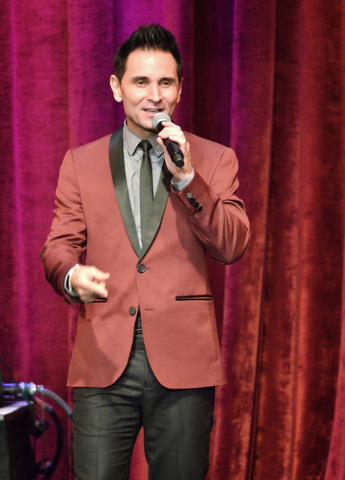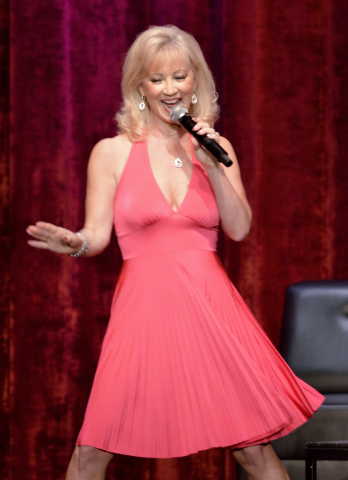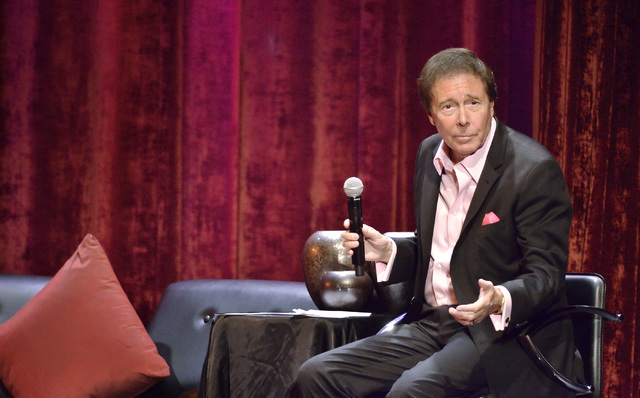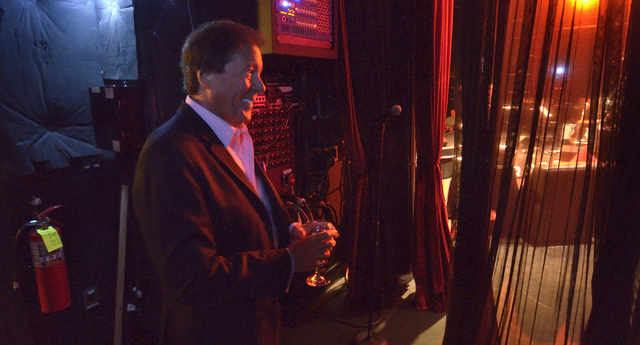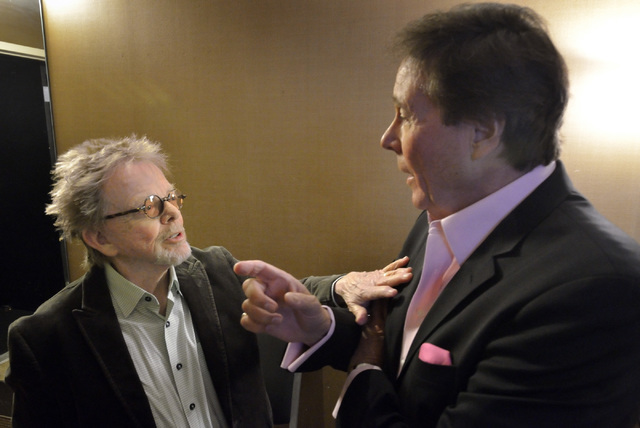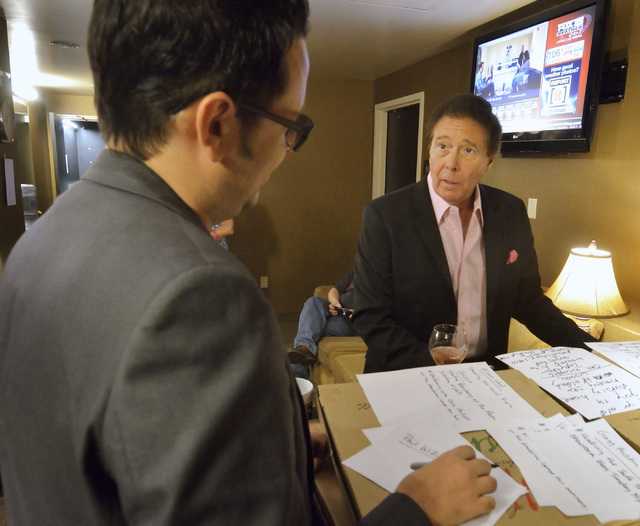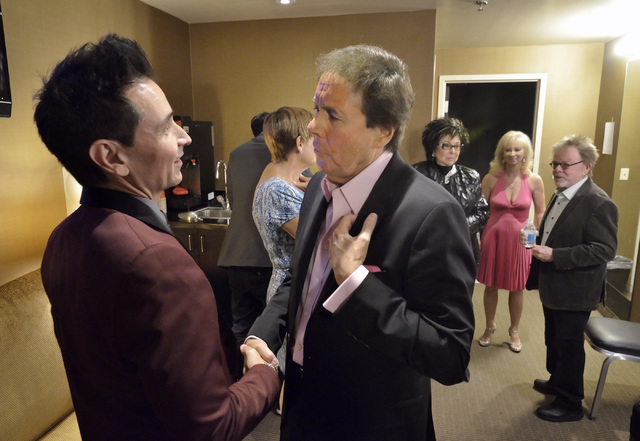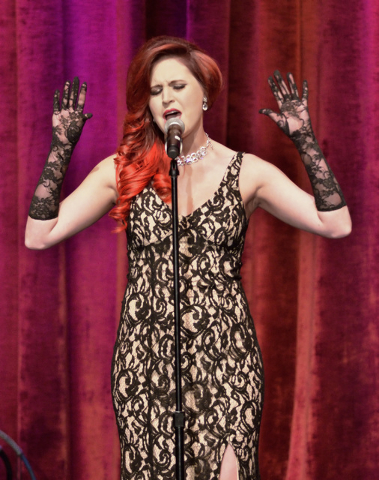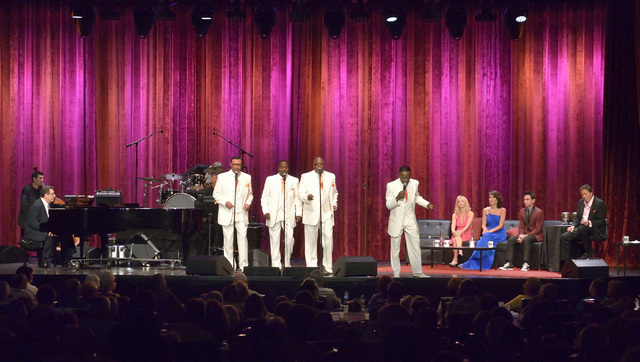Dennis Bono’s weekly variety show a must-see for many
Dennis Bono stands backstage in the South Point showroom, in the wings to the right of the stage. He takes a sip from a glass of wine — nothing fancy, just a bit of white zinfandel — stretches, breathes deeply and shakes his head as if to focus.
Then the band plays, and Bono strides confidently onstage as the audience applauds, welcoming him like a favorite uncle they haven’t seen since, well, last week.
And with that, Bono begins the latest edition of what may well be the most popular lesser-known show in town.
Every Thursday at 2 p.m., “The Dennis Bono Show” plays to a packed house of a few hundred people at the South Point and then to what Bono estimates is another 11 million listeners via radio stations (see www.thedennisbonoshow.com for listings) and online (https://soundcloud.com/thedennisbonoshow).
Bono created the show 16 years ago as a talk show that includes a bit of comedy, a bit of conversation and a lot of music. And even if Bono’s musical stylings lean toward American standards, the show is musically universal enough to welcome everything from pop to country to R&B and, today, even a bit of techno.
For Bono, the show is the latest chapter in a career that began in Hartford, Connecticut. After entering show business, “I had the record. I did all the Playboy Clubs. I traveled around the country and, 500 words or less, paid my dues,” he says.
During the late ’80s, Bono released an album that Frank Sinatra associate Jilly Rizzo heard. Sinatra and Rizzo “came to New York to meet me and put me to work with Don Rickles,” Bono says. “To make a long story short, I ended up coming out to Las Vegas.”
“I went to the Desert Inn for six weeks and was there for about 2½ years. I opened up for Don Rickles,” Bono says. “I did all kinds of things.”
But, eventually, Las Vegas began to change.
“I had been a working kind of guy, an interpreter of the Great American Songbook, that style of music,” Bono says. “When I first came to Vegas, that was very popular. But I could see it kind of changing.”
Searching for an alternative to going out on the road, “I came up with this idea,” Bono says. “I just thought it would be something different. I wasn’t sure if it was going to click, and after about a month, it really caught fire.”
The show ran at Sunset Station, then Sam’s Town, before moving to the South Point, Bono says.
Each show opens with a monologue by Bono, who then chats with co-host Corrie Sachs and introduces guests who perform and then join Bono for a casual interview. It’s a briskly moving show that typically runs a bit over an hour live (but is edited down to 60 minutes for radio and internet play).
The live audience — free tickets can be obtained with a South Point players card — is populated mostly by retirees, mostly because of the midafternoon showtime, although Bono says the radio and online listening audiences skew younger.
It’s a “very discerning” audience, Bono adds. “When somebody’s good, even if it’s a style they don’t particularly gravitate to, they love it when somebody is good because they’ve basically seen it all.
“But we sell out every week. Five hundred people. It’s part of their routine, part of their social life. Some people come in at 7 in the morning. They meet up, go to breakfast, gamble, then meet at 10:30 to pick up their tickets, then have lunch and come to the show, and they’re here until 4 or 5 in the afternoon.”
“We’ve seen him in all of the different locations he’s been in,” says Joan Wright, an audience member who’s at the show today with Nicholas Steffora.
She smiles. “Which means he can’t lose us, right?”
“The shows are very good,” Steffora says.
“And such a convenient time, away from the hustle bustle,” Wright says. “And even if you’re not familiar with the act, they always give such a good show.”
After 16 years, the show is a well-run entertainment machine. Bono says finding guests each week is no problem thanks to the show’s longevity and reputation. And, he says, “I surround myself with the most talented people.”
“Now I’m like the captain of a ship,” Bono says. “My only job is to make sure I don’t smash it into the rocks and just keep it where it’s supposed to be.”
“I’m having a good time doing it,” Bono says. “That part is contagious. I think when you enjoy what you’re doing and have passion for it, it just becomes contagious.”
Also key to the show’s success is the South Point’s support, Bono says. “I’ve loved where I’ve worked before, but (owner) Michael Gaughan, he’s like an old-school guy, and this hotel has made us feel so welcome. So it’s a wonderful match.”
Backstage, the vibe is more band camp than big-time showbiz. Guests hang out in a common room, rather than hiding out in their dressing rooms, and pose for a photo doing what Bono calls “the South Point” by goofily pointing in a random direction.
It’ll be singer Vanessa LeGrand’s third appearance on the show.
“I love it,” she says. “I love it that Dennis does that old-school Vegas vibe that you really don’t have anywhere else. He’s really good about capturing that.”
As showtime nears, Bono offers a Vegas-appropriate benediction to the cast. “All right,” he says. “Everybody have fun.”
And they do. After the show, the guests and Bono meet fans, pose for photos, sign autographs and sell a few bits of merchandise. Finally, it’s just after 4 p.m. and another show is in the books. Bono’s immediate plans are to meet a friend for a drink and then head home to watch a baseball game. He says he enjoys doing the show and figures he’ll do it as long as he can and for as long as it’s fun.
“I get it,” Bono says. “I’m 69. I’m not competing against anybody.
“I’m very grateful for the opportunity to be doing what I’m doing, still singing and still having a great relationship with performers and other talented people and having a very loyal audience.”
Read more from John Przybys at reviewjournal.com. Contact him at jprzybys@reviewjournal.com and follow @JJPrzybys on Twitter.



